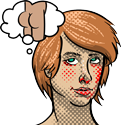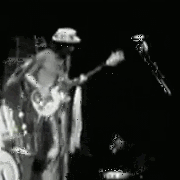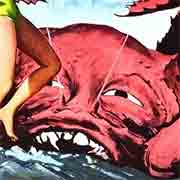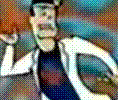|
Just finished Kate Griffin's Neon Court (third book in the Matthew Swift series). The plot is rather predictable and a bit too close to the first two novels for my taste, even though the superb atmosphere of London-as-a-magical-setting makes up for it. Looking forward to reading Minority Council next, and hoping that it doesn't involve Swift and the angels being chased by a yet another seemingly invincible avatar of instant death (Hunger/Death of Cities/Blackout) for 90% of the book.
|
|
|
|

|
| # ? May 16, 2024 16:32 |
|
Niceville by Carsten Stroud (3.5 stars out of 5) http://www.amazon.com/Niceville-Carsten-Stroud/dp/030770095X/ref=sr_1_1?ie=UTF8&qid=1343234165&sr=8-1&keywords=niceville This book is like taking characters from a Elmore Leonard novel, and putting them in subplots out of a Stephen Hunter novel and a major plot out of a Stephen King novel, plus have Stephen King write the whole thing with a editor that keeps him around 400 pages. In the first couple of chapters a boy disappears into thin air (supernatural style), and a crazy bank robbery happens with one of the robbers using a Barrett 50 cal. Throw in a town with a evil past, and that is pretty much this book. It was a super fast read with interesting characters and a pretty decent overall plot. The problem is the book is way too short. When the climax happens it feels way too soon (build up could of been more), and the book basically (not a plot spoiler) ends with us still in the middle of the most of the subplots. I felt like I was missing about 3 or 4 chapters. There has to be a sequel, but who knows. It could be some literary device by the author. .
|
|
|
|
A while ago I finished A Frolic of his Own by William Gaddis, the last of his novels I had to read (and I'm considering re-reading The Recognitions so I guess I'm smitten). The story's another of his dizzy American aristocrats suing Hollywood for both for stealing his play, and for changing things and ruining it. It's the most shapeless of his novels; it's not ratcheting up into a great calamity, but drip-feeding humiliations and deprivations. Instead the characters fight each other like cats in a bag, continually changing who they hate and for what reason and going nowhere. It's great fun seeing these people espouse contradictory things while their essential nature remains clear and distinct. At about the same time, I finished Samuel Butler's Erewhon. It's basically a series of satires topped and tailed with some acceptable Victorian-era adventure. Once established in Erewhon, everything is "England, but weird" and he is carted to and fro without much incident. He plays the rhetorical game of taking a perverse opinion and then justifying it and he can form a beautifully reasoned pearl around the most sinister bit of grit. These premises aren't just forced wackiness either, but possible ethics for still-common unethical behavior. Sometimes the observations can be too on-the-nose or less-relevant than they were, but there's still an incredible hit rate. Finally, I picked up and finished Huxley's The Doors of Perception on a long drive. Two short pamphlets espousing the benefits of mescaline and elaborating on the theory. Apparently the brain is a "reducing valve", taking the stream of total-knowledge and discarding all the information unhelpful to personal survival. Mescaline (and LSD, hypnosis, flashing lights, malnutrition, physical pain, genius and Schizophrenia) reduces the effectiveness of the brain, of the reducing valve, so you can experience a little more truth. Beautiful, hyperlexic prose and incredible knowledge, but a subject I cannot be convinced of. It's also tragic seeing the talk of incorporating mescaline into a religious life when you compare it to the hedonism of the sixties. I shall probably read it again, but not for a while.
|
|
|
|
Just finished The Big Short, by Lewis, of Liar's Poker fame. Just a fantastic book, that's really hard to put down. You will get very, very angry as you read this book, at the depthless greed of the finance worker, and the lack of oversight, regulation, and gall on everyone's part. Also, if you're anything like me, you'll walk away loving Steve Eisman. He walks around the world of finance as the only sane person during the lead up to the housing crisis, and frequently blurts out his disbelief in what he's hearing at inappropriate moments. He was right, and he knew he was right, and he was positioned right for it, so it gave him this supernatural candor, it's fantastic.
|
|
|
|
|
I just finished Vineland by Thomas Pynchon today. I was blown away by this: it was simultaneously off the wall, funny as hell and had some of the best writing I've read in a while. It's a really silly book, in one sense (there's a TV-addicted DEA agent, a secretive ninja group, UFOs and hippies), but there's a serious undercurrent here too. On this level, it's an interesting look at America in the Nixon and Reagan years, between the war on drugs and Cointelpro and the people who abuse power. Recommended.
|
|
|
|
Just finished The Pale King by David Foster Wallace. It is the first book I have read by him and I was very impressed by his writing style (not the footnote thing particularly). I found it thoroughly enjoyable although infuriating to describe. As soon as I would say IRS people's eyes would glaze over.
|
|
|
|
All Creatures Great and Small (James Herriot). The first of a series of books on Herriot's animal adventures in Yorkshire. Some chapters carry over, some don't. Something about this reminds me of Lewis Grizzard, perhaps it's that both just knew how to write about people, though with totally different attitudes. This is a light read, nothing deep (unless you find a certain spirituality in cow pregnancy), but enjoyable all the same. So Big (Edna Ferber), 1925 Pulizer Prize winner. Reading this, I was reminded of three books. The beginning is somewhat Main Street, with bits and pieces of The Grapes of Wrath thrown in, though So Big came 10 years earlier. The middle and end have a An American Tragedy vibe, though the plots aren't similar. The first half is fine, but when Pervus dies, it starts going downhill. Selina's fortunes change that quickly and that much? The coincidence that gives you that is equally unbelievable. Characters at this point lose all of whatever little nuances Ferber had been giving them. They're either good, fulfilled self-made men or women, or they're boring upper class twits with no imagination. No shades of grey, not even with the title character, Dirk, is immune from this. I think she tried to cut some middle ground with Paula, but nothing feels true about it. The three books I mentioned earlier, even Dreiser's ultimately flawed An American Tragedy are infinitely more interesting.
|
|
|
|
Just finished "Talk Talk" by T.C. Boyle, and I thought it was great. It's about a Deaf Woman who loses her identity to a con-artist and then goes across country to try and get it back. Boyle really did a great job communicating the inner thoughts of someone who can't communicate too well, which (obviously) had a really interesting impact on the story.
|
|
|
|
The Passage by Justin Cronin This book was definitely part Andromeda Strain and part The Stand. If you like either, especially The Stand, you'll probably enjoy it. Basic premise: Government/military finds a virus in the jungles of Bolivia that has the capacity to make people immortal monsters (vampires, it's just dumb, mutant vampires). Decides to take the virus into a lab to see if they can weaponize it or turn it into medicine. Apocalypse ensues. Throughout the book Cronin makes attempts at poetic narrative which fall flat in a way that I can't really explain. The first act is very much Andromeda Strain, with much more compelling characters, less Crichton-esque MD sperging, and some very well done storytelling for the genre. The geopolitical situation that Cronin hints at is fairly different from ours, but I hope that it gets fleshed out in the next two books because it was really just mentioned in passing ("The 2008 terrorist attacks in Chicago") and it seems like he's created an interesting alternate world. The second act is the post-apocalyptic setting act, set 100 years in the future in "First Colony". This is much more The Stand and very much not The Road. A poorly characterized gang of under-introduced or stereotypical (yeah the redhead gets superpowers) people decide to save the world one set-piece at a time. I have a huge hard-on for post-apocalyptic fiction, and this was really not poorly written at all, or gag-inducing, so I loved it. YMMV. 4/5 for making vampires cool again. The Moon is a Harsh Mistress by Robert A. Heinlein Yeah this is excellent classic sci-fi. Heinlein writes about a penal colony on the Moon. The prisoners decide to revolt because they are in a trade relationship with Earth that can only end in depletion of the Moon's natural resources, the revolt is made possible and helped along by the Lunar Authority's supercomputer that gains sentience one day. Like all really good classic science fiction, the setting is pretty much tertiary. This is a novel about developing countries, political ideology, class war, globalization, gender issues (marriage is a gender issue, right?), and so much more than just a moon colony. I really really liked it, and it's made me want to start reading more classic sci-fi. 4/5 Just started Rocannon's World by Ursula K. Le Guin. tuyop fucked around with this message at 19:02 on Jul 29, 2012 |
|
|
|
|
The Atrocity Archives by Charles Stross. 4 stars.Me on Goodreads posted:At first, with the slow start, the overwhelming amount of jargon (organisational acronyms, bureaucratic terminology, etc) and overly cynical tone I thought I wasn't going to like this book. But then the story kicked into gear and I found myself enjoying the ride. It got even better with the 80-age novella included at the end, which I loved the hell out of. The novella was a really cool, swift, and exciting story involving a classical monster updated for the modern age of hi-tech and paranoia. I'd give the main story 3.5 stars and the novella 4.5 stars, hence my final score of 4. (The 15 page essay about spy and horror fiction was also pretty interesting too, a nice final bonus to round off the book!) A question for goons who have read all of this series: I've heard people talking about Case Nightmare Green, how it will be finally revealed in an upcoming book, but in this book CNG is hinted to take place in 2007. Are all the books published so far, even the one which just came out, set before 2007, then? Hedrigall fucked around with this message at 06:10 on Jul 28, 2012 |
|
|
|
Just finished Mortal Engines by Philip Reeve. It's pretty good YA stuff, and the Municipal Darwinism is a super cool idea. The writing itself is pretty decent, but the characters are really great. I started the sequel tonight and am already over half-way through.
|
|
|
|
Hedrigall posted:The Atrocity Archives by Charles Stross. 4 stars. I've read all of them, and in the latest at least no dates are mentioned. I get the feeling it's set in a perpetual 'a year from now' future, and while the Laundry is definitely ratcheting up for Case Nightmare Green drawing closer, it's also definitely not there yet. I really enjoy the series a lot, and the books are getting more interesting all the time.
|
|
|
|
The Hundred Years War, Vol. 1: Trial by Battle by Jonathan Sumption. Covers the origins and first decade of the war, up to the siege of Calais. I don't really know a lot about this era, just what everybody knows: Crécy, the Avignon popes, John de Montfort and Charles de Blois. But the main theme that emerges is money: the King of England is virtually bankrupted before the first invasion takes place and is reduced to forcing loans from his own subjects and even hocking his loving crown, and the French king isn't in much better shape either. At the same time, horrible wastes of money as these kings, despite having a bank account showing zero dollars, despite having left their troops unpaid and defenses in disrepair, despite risking (and in some cases, causing) revolt by their own people protesting the onerous taxes, still find it necessary to stage tournaments and extravagant balls. The kings also give out extravagant gifts to their loyal friends (parcels of land, rights to collect duties, that kind of thing) but they don't do it systematically, just on a whim. To me that is another thing that stuck out from the era: the absolute arbitrariness of monarchical rule. This guy who had his lands taken away by enemy occupation is compensated by the king, but this other guy gets nothing. It's all by the king's grace, so he doesn't have to justify his decisions. It is such a weird system, I'm never not surprised it lasted in some form or another for such a long time.
|
|
|
|
Just finished The Yiddish Policeman's Union by Michael Chabon. I'd come off reading both of Franzen's novels, and my buddy recommended Chabon for "a little more fun." Boy, was he ever right. Yiddish... is a great hard-boiled noir story with lots and lots (and lots) of Jews! There was a little work to be done in terms of understanding all the Yiddish terms and idioms present throughout, but context clues and repetition of key terms made it very accessible. It veers off in a pretty heavy direction around the third act, and the ending is a little "blah,' but it's full of really well-developed characters and a lot of great one-liners and snappy dialogue. 4/5. Read this book!
|
|
|
|
Have you read The Amazing Adventures of Kavalier and Clay? I'm a fan of Chabon's novels and I'd argue it's his best.
|
|
|
|
Rocannon's World by Ursula K. Le Guin 3/5 Obviously her first novel, the characterization was pretty weak. I read The Left Hand of Darkness in High School and I think I'm going to gradually make my way through the Hainish series. On to Starship Troopers now!
|
|
|
|
|
Seconding the love for Kavalier and Clay. Definitely his best and one of my favorites. I almost bought Wonder Boys today to complete my Chabon collection, but got Auster's New York Trilogy instead. I finished Ghostwritten, David Mitchell's first book. It's sort of a dry run for what I think is his best, Cloud Atlas. It has 9 somewhat interconnected stories taking place across the globe - one in Mongolia, one in Tokyo, one in London, one in New York, and so on. Each is a pretty cool short story by itself, but the second-to-last segment ties them all together in a pretty weird and cool way. Mitchell has to be one of my favorite authors now. Also: several links to Cloud Atlas in this book, just like in his coming-of-age-in-the-80s novel Black Swan Green.
|
|
|
|
barkingclam posted:Have you read The Amazing Adventures of Kavalier and Clay? I'm a fan of Chabon's novels and I'd argue it's his best. I'm in the process and enthusiastic thus far.
|
|
|
|
barkingclam posted:Have you read The Amazing Adventures of Kavalier and Clay? I'm a fan of Chabon's novels and I'd argue it's his best. Don't get me wrong here--I absolutely love Chabon and think K&C is one of the best novels of the last two decades--but I always felt it loses intensity after the war, and while that's appropriate for the narrative, it does mean the novel loses some of its charm. For that reason, I personally prefer Summerland and Gentlemen of the Road, the latter especially because it is so sharp and well paced. Really though (and I know this is not the recommendation thread) I recommend everyone read everything by Michael Chabon, including his essay collections.
|
|
|
|
I finally finished Jerome K, Jerome's Three Men in a Boat. It took more than a month because my eyes would glaze over after a couple chapters. The Victorian prose is thick and rambly, but drat it was worth it. Comparing him to P. G. Wodehouse though, Wodehouse gets to the punch a lot quicker, but they both have the same general flavor. I decided to re-read Alfred Bester's The Stars My Destination after nearly fifteen years. I tried to take it slower this time, because all I remembered was the wild ride. I still ended up finishing it in a night. That book is way more gonzo than I remembered. All I could remember was Gully Foyle's incredible character development. I forgot all about the constant barrage of bizarre concepts that the characters treated like everyday humdrum. I just subsumed them into my subconscious, and they're coming out in my own writing, which makes re-reading Bester an eerie experience. I also forgot about the synesthesia bit with the weird type-setting. After re-reading Mark Twain as an adult, I picked up on exactly what he was doing, which made it far more interesting a second time around. The whole thing reads like a potboiler with a literary edge. It's amazing. The prologue though, I skipped it and read it after. It seems like the publisher forced him to write it: "Please explain your wierd-rear end poo poo. I don't think our readers will get it." So he just hammed it the gently caress up. It's hilarious. I'll have to pick up The Demolished Man again, because it's currently sitting half a country away in my dad's library. I wonder how much that one influenced me as well.
|
|
|
|
Finished The Man Who Loved Children by Christina Stead the other day, which was the kind of book where when I finished all I could think was, "Why the hell hadn't I heard of this before?" From the premise it seems like light reading, almost like a hokey Disney movie: The Pollitts live outside of Washington DC in the 1930s in a big ramshackle house, with their own funny family cant lexicon and their own little zoo. Before long, though, it becomes apparent that something's definitely off, and Henny's rants get meaner, and Sam's hosed-up views on eugenics and the role of women in society percolate to the surface, and you see how much his kindness to the children is predicated upon them amusing him and falling in lockstep with his ideas, and the cruelty and the tantrums crescendo, and what started sorta in the guise of a trifle becomes pretty goddamn psychologically devastating. It creates a world as well as anything I've read, and as much of a pain in the rear end as I generally find Jonathan Franzen to be, I think he's 100% right that it belongs in the literary canon.
|
|
|
|
The Windup Girl by Paolo Bacigalupi - Excellent read along the lines of William Gobson's old stuff like Neuromancer or Count Zero. Unlike Gibson his focus is more on BioPunk rather than CyberPunk, genetic engineering without a single ethical gently caress being given is the core of the Windup Girl. Ghostwalker by Eric Scott deBrie - Just re-read that because I felt the need to read a story about cold-blooded revenge by a boy left for dead by his Step-Father. So much betrayal and double/triple-crossing it would make your head spin if it wasn't written in the Forgotten Realms setting.
|
|
|
|
I just finished BEE's Glamorama. I have now officially read all of his novels, but anyone care explain to me what the gently caress did I just read? I liked it, I think I did, but I feel like I was on a acid trip while reading it. While Lunar Park left me confused the confusion was nothing like this. I have no idea what was real, and I'm unable to come up with a theory of any kind outside of Victor leaving his old self in Europe while his new evolved self is back in New York. Help anyone?
|
|
|
|
Future Babble: Why Expert Predictions Fail - and Why We Believe Them Anyway by Dan Gardner. Title says it all: there are a large number of amusingly terrible predictions in this book. Also the usual cog psych suspects (Tversky, Fischoff, Milgram) and the cognitive biases our brains use to convince ourselves that we never go wrong. Not nearly as meaty as Duncan Watts' Everything Is Obvious: *Once You Know the Answer, which covers a lot of the same ground.
|
|
|
|
Truly, Deeply Disturbed by Andrew Nienaber. gently caress this book. It had a fairly interesting concept: the narrator is a serial killer who stalks and slaughters (I use that word based on his exceedingly-detailed accounts of evisceration and such) people that are basically dicks to others (think Andrew Dice Clay: "so many assholes, so few bullets"). There's an all-too-familiar plot turn early on (innocence vs. violence), but the book never ever reaches its potential since everything happens goes exactly as planned for our intrepid heroes! Needful Things by Stephen King. I actually found this book riotously funny. It seemed that King enjoyed destroying Castle Rock and tearing down the world he so meticulously built in his previous few novels. Lots of great turns and twists, and some truly hilarious moments as the poo poo starts to hit the fan. I can't think of any other novel where the antagonist yells "Open that metal trap of yours and BLOW ME! Gobble down my crank!" at an unsuspecting housewife. The ending is a little histrionic, but I guess if the bad guys have magic, why can't the good guys, too? 5/5. Benjamin Franklin: An Autobiography by...you guessed it. I was grinning ear to ear throughout this. It's a wonderful and an expertly-written memoir. Sure, he rambles in places, but it's just so drat charming. 5/5. The Complete Works of HP Lovecraft. The Kindle version was was $.99, so why not? Some big hits, some big misses, lots of eh. The thing that is both great and terrible about Lovecraft's writing is that he often leaves the scariest moments to your imagination. While this works fabulously in The Statement of Randolph Carter, I often felt that it would have been more effective if he would have just spelled it out. 3/5 overall.
|
|
|
|
David Wong's This Book is Full of Spiders, which is the follow-up to John Dies at the End. I can say that if you loved the first book you will enjoy this one, but it isn't nearly as good. Whereas JDATE (uh...) had lots of supernatural weirdness, horror, and "what the gently caress?" moments to go along with the gore and goofiness, TBIFOS has a familiar, straightforward plot and a great deal more graphic violence. Still a lot of fun, and John definitely got a few sincere guffaws out of me, but it lacks the spark that put JDATE over the top for me. Also, as a side-note, there is an r-word that featured prominently in JDATE that is conspicuous for its absence in TBIFOS. Wonder if someone gave him poo poo for using it...
|
|
|
|
Just finished Connie Willis' To Say Nothing of the Dog, a playful romp through time (mostly the Victorian era) full of literary allusions. I think I would have enjoyed it more if she didn't lay the exposition on so thick. I get she was mimicking Agatha Christie novels (because she kept on going wink wink, just like in those Agatha Christie novels) with the characters running down the clues over and over, but having devoured the near 500 page book in a day, it was getting loving tiresome. The literary references were pretty heavy handed too. Maybe if I hadn't just read Jerome K. Jerome, I wouldn't be thinking, ok it's just like Three Men in a Boat. Yes, you're doing that thing where—oh god why are you turning around and telling me, I know what you just did. Stop loving winking at me. I get it. Having just read The Stars My Destination didn't help either, because there's a writer who trusted the reader to get poo poo from context, and kept moving. He didn't keep stopping the story to explain, then over-explain, then beat you over the head with it again in case you didn't catch it the tenth time. Has anyone else read Connie Willis? Is she an over-explainer in all her novels, or is this one an outlier? I have a copy of Passage on my reading pile and I'm wondering if I should bother.
|
|
|
|
Just finished High Fidelity. I actually read the whole thing today because it was a slow day at work. It was great, first Nick Hornby book I've read. About A Boy is next, and I've never seen either movie, so I guess I'll get to those as well.
|
|
|
astr0man posted:Just finished High Fidelity. I actually read the whole thing today because it was a slow day at work. It was great, first Nick Hornby book I've read. About A Boy is next, and I've never seen either movie, so I guess I'll get to those as well. I finished Howl's Moving Castle. Maybe I would have liked it as a kid but it was a slow 200+ pages and didn't have a strong enough plot to keep me more than passively interested. UltimoDragonQuest fucked around with this message at 00:32 on Aug 2, 2012 |
|
|
|
|
Legacy of Ashes: The History of the CIA by Tim Weiner, which describes disaster following distaster, culminating in the Iraq/WMD "intelligence" that sealed their fate as laughingstocks. The author claims this history of ineptitude stems from the decision made early on to focus 90% of their resources on covert action as opposed to intelligence gathering, which resulted in an almost total ignorance of what what going on in the USSR over the 40 years of the agency's history.quote:The CIA did not know that Gorbachev had told the Warsaw Pact meeting in May 1987 that the Soviets would never invade Eastern Europe to shore up their empire. The CIA did not know that Gorbachev had told the leader of Afghanistan in July 1987 that the Soviets were going to start pulling their occupying troops out soon. And the agency was flabbergasted in December 1987, when throngs of adoring American citizens hailed Gorbachev as a hero on the streets of Washington. The man in the street seemed to understand that the leader of the communist world wanted to end the cold war. The CIA did not grasp the concept. Bob Gates spent the next year asking his underlings why Gorbachev consistently surprised them. A frightening book.
|
|
|
|
dokmo posted:Legacy of Ashes: The History of the CIA by Tim Weiner, which describes disaster following distaster, culminating in the Iraq/WMD "intelligence" that sealed their fate as laughingstocks. The author claims this history of ineptitude stems from the decision made early on to focus 90% of their resources on covert action as opposed to intelligence gathering, which resulted in an almost total ignorance of what what going on in the USSR over the 40 years of the agency's history. Weiner's new book, Enemies: A History of the FBI is also really good. If you liked Legacy of Ashes you should check it out, and there's actually quite a bit of overlap between the FBI and CIA, and Weiner spends a while detailing their rivalry and mutual escapades.
|
|
|
|
The Mismeasure of Man by Stephen J. Gould. A critique of historical and recent efforts to measure the mental prowess of people and peoples. Fantastic book. The first part, concerned with phrenology, is on the one hand a history of the practice and on the other hand acts as a cautionary tale about a priori convictions and how they subtly influence our thoughts and actions. Gould's reanalysis of old phrenological datasets with his knowledge of modern statistics is particularly interesting. The second part of the book both historically and scientifically deconstructs the notion of an IQ score as a measurement of intelligence. On the side, Gould teaches the reader about principal component/factor analysis. Despite the seemingly dry subject matter, the book is written in a very engaging and heartfelt fashion while at the same time making completely convincing arguments. I might be biased because Gould is easily my favourite non-fiction author but this book is equally great from a literary, scientific and social point of view that EVERYONE should read it. Running the Rift by Naomi Benaron. Coming of age story of a Rwandan athlete around the time of the 1994 genocide. It's solidly written but lacking any kind of artistry, very YA lit like. I also couldn't shake the feeling of insincerity since it's a book clearly written for a white audience by a white author. An author who learned about Rwandan life, culture and history from mostly second hand accounts. Tellingly, the best parts of the book were about running and geology, which are things the author is actually trained in. Write what you know and all...
|
|
|
|
The Gun Seller, by Hugh Laurie. yes, Dr.House wrote a book. like Wooster crossed with Mike Hammer. pretty funny. his first book, and a good start. a pretty light read, but i *like* Twinkies with whipped cream. also just reread again The Difference Engine, by William Gibson. an alternate history story of an information age starting a hundred years earlier, with Babbage style difference engines instead of silicon. very intricate, watch for the curious parallels between the IT slang of then and now (gear-yards, clackers, kinotypes).and the savage Texians, from that strange place Texiana. this book is the definer for the steam punk genre- all else is low-grade dog food beside it, i think, so far. this is the first time i understood the ending- you must read the last few chapters VERY CAREFULLY.and the afterword. zimboe fucked around with this message at 10:50 on Aug 3, 2012 |
|
|
|
dokmo posted:Legacy of Ashes: The History of the CIA by Tim Weiner, which describes disaster following distaster, culminating in the Iraq/WMD "intelligence" that sealed their fate as laughingstocks. The author claims this history of ineptitude stems from the decision made early on to focus 90% of their resources on covert action as opposed to intelligence gathering, which resulted in an almost total ignorance of what what going on in the USSR over the 40 years of the agency's history.
|
|
|
|
The only illustrations are pictures of pudgy middle age white guys in suits with fake smiles looking furtive.
|
|
|
|
I have recently finished reading Mageborn: The Blacksmith's son (Book 1), The Line of Illeniel (Book 2) and The Archmage Unbound (Book 3) by Michael G. Manning. I have enjoyed reading all three books, though at times it is a tad too convenient that the books left behind by Mordecai's ancestors contain exactly the kind of information he requires. Another example would be the hidden talents of his friends happen to fit right into the plot. All in all this does not get too much out of hand and it is not your typical "nothing bad could ever happen" kind of story.
|
|
|
|
The Body in the Library (1942) - Agatha Christie The truth is, you see, that most people – and I don’t exclude policemen – are far too trusting for this wicked world. They believe what is told them. I never do. The Body in the Library was Christie’s second novel to feature Miss Marple, elderly spinster of St. Mary Mead, though she had been featured in a number of short stories previously. It is generally considered to be one of Christie’s masterpieces and the best of the Marple novels. For my money, Christie actually bettered this one in 1943 with The Moving Finger, which is a magnificent and gripping Marple novel, but it would be churlish to let my preference for another entry in the series make me attempt to argue down the status of this one, which is certainly the masterpiece it’s been rumored to be. Even back in 1942, a dead body in the library of a stately country home was a huge cliché. Christie, by her own admission, wrote her take on it as something like a dare to herself, to challenge herself to do something with the hackneyed plot that would actually be entertaining and of high quality. It is, of course, no spoiler to say that as the book opens, the happy home of Colonel and Mrs. Bantry is shattered by the discovery that there is a heavily made-up, fancily dressed dead blonde in their library. Village gossip being what it is, few people are prepared to believe the assiduous statements of the good Colonel that he has no idea who the dead woman is. It’s clear to everyone that Colonel Bantry was into something scandalous. The nervous, highly socially conscious Mrs. Bantry can’t take much more of this. Luckily, she has a dear friend who lives down the lane, a quiet old spinster with a strange intuition for puzzles of all sorts. Mrs. Bantry calls Miss Marple in on the case, in a scene that is characteristic of the warm, personality based humor that suffuses the entire novel. Miss Marple states that she hopes that she can be “some comfort to you” in Mrs. Bantry’s hour of need. “Oh, I don’t want comfort,” Mrs. Bantry says, “But you’re so good at bodies.” “Oh no,” Miss Marple demurely hesitates, “My successes have been mostly theoretical.” This isn’t, in a word, one of Christie’s dark novels, as The Moving Finger, for example, most assuredly is. Oddly enough, that’s fine. Christie was one of the rare writers who excelled at both light comic romps and dark psychological thrillers. But back to the plot, or rather, not back to the plot, since, frankly, anything more than that would be kind of a spoiler. The above summary doesn’t even get all the way through the first chapter, but to even hint at the myriad twists and turns and discoveries that Christie has in store for the reader would be shameful. Christie’s novels remain the kind that should be read with as little foreknowledge as possible. Sometimes books are more enjoyable with a good, lengthy, in-depth introduction by a scholar in front of them. Agatha Christie’s books are not those kinds of books. But if you’re secure enough in your intelligence to put genre distinctions behind you, these books are literary masterpieces. The pitfall of a genre writer is slavish adherence to convention and mindlessness. No one who has read Agatha Christie would ever accuse her of either of those things, except in certain instances, of which The Body in the Library is not one. The Body in the Library is as much an essential read as something like, well, let’s not pick anything in particular; I’ll just say it’s essential and deserves to stand on the shelf with the more “serious” “masterpieces” that people populate their shelves with. It is, for one thing, desperately funny. For another, it isn’t even two hundred pages long and yet is constructed so deftly that Christie is able to pack in twist after twist after twist without, unbelievably, making the book seem rushed at all. The pacing feels, as it often does in a Christie novel, languid and relaxed even as you realize with one part of your brain that it can’t actually be either of those things, that Christie has in fact planned this book down to the comma and is propelling you with not a single wasted word toward the climax she knows is coming. Christie’s characters are less flat here than they sometimes are. She creates genuine personalities and draws humor from those personalities, rather than falling back on situation based humor. Christie’s books are often more philosophically complex than people give them credit for. She often has a theme that she is attempting to mine. This is easier to see in her darker novels than it is in her comic ones, I think. It’s easy for people to latch on to the fact that And Then There Were None is, for example, a work of genuine philosophical literature and that it has genuine themes and motifs that she is working with. But even her lighter material often had those same things. Partners in Crime, which is, probably her lightest work and certainly her funniest, is undeniably a thematic riff on fiction itself, a short story cycle that is as much an exercise in metafiction as Calvino’s work. Well, perhaps not “as much” as Calvino, but I think you see what I’m getting at. The thematic issue in this one seems to be the disruption of the family. There might be something very modern about it, something about the way the war was disrupting families and changing families forever. The intrusion of a dead body into the Bantrys’ home opens the novel and their inconvenience is mostly played for laughs. But later the investigation leads to a family that is decidedly strange, a family that has been warped by death. The aging Conrad Jefferson has lost both his son and his daughter to violent death, but he travels with his son’s widow, Adelaide Jefferson, and his daughter’s widower, Mark Gaskell. Adelaide also brings along her son from a previous marriage, Peter Carmody. Together they form a family of incredibly tenuous connections and in the confusing glut of last names that this one “family” has to deal with, Christie seems to capture something of our modern world. Conrad Jefferson travels with a son, a daughter and a grandson to whom he has not a single blood connection. There’s more going on there than just a confusing family; Christie is, I think, saying something about the increasingly fluid bonds of family and of identity. There’s more I could say to back up this theory of the novel, but it would require revealing more about the plot than I’m comfortable with. But when the novel is read with an eye to what Christie is saying about the family as no longer concrete, the details will leap out as obvious, I think. At the end of the day, this book gives a kind of pleasure that is absolute and perfect. It does not replace more literary or more “serious” kinds of reading, but neither can all the “serious” books in the world replace the experience of a genre novel written with a sure hand, a philosophical point and a cracking good plot. Agatha Christie remains the bestselling mystery novelist of all time. Perhaps the highest praise that can be given to her is for me to simply point that fact out and then note that most of the time there is a certain amount of injustice felt about who ends up as a bestselling author and who doesn’t. In this case, however, there is no injustice. Call Christie a rarity: a best seller who deserves it. 5 out of 5 stars.
|
|
|
|
Just finished Dune the other day. I can't believe my dad gave that to me to read in late elementary/early middle school. 
|
|
|
|
Chiba City Blues posted:Just finished Dune the other day. I can't believe my dad gave that to me to read in late elementary/early middle school. I also just finished Dune. It had been quite a while since my last reading. I'm still annoyed at how Paul more or less just mopes around a lot about how he's so high he can see time  , and there is very little detail in the first book of just how important it is for Paul to actually be the Kwisatz Haderach. Those complaints aside, it is still probably my favorite sci fi book ever. , and there is very little detail in the first book of just how important it is for Paul to actually be the Kwisatz Haderach. Those complaints aside, it is still probably my favorite sci fi book ever.
|
|
|
|

|
| # ? May 16, 2024 16:32 |
|
Just finished Red Dragon. By far my favorite part of the novel was the look into Dolarhyde's past. Hell, pretty much everything involving Dolarhyde was good. He was a really interesting character.
|
|
|





































